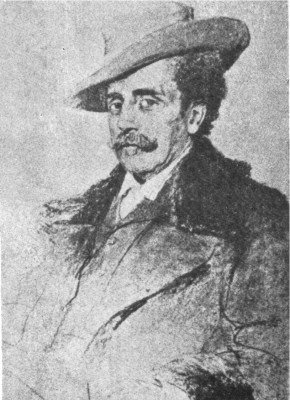Antonio Labriola facts for kids
Quick facts for kids
Antonio Labriola
|
|
|---|---|

Antonio Labriola
|
|
| Born |
Antonio Maria Marziale Labriòla
2 July 1843 Cassino, Papal States
|
| Died | 12 February 1904 (aged 60) |
| Alma mater | University of Naples Federico II |
| Era | 19th-century philosophy |
| Region | Western philosophy |
| School | Marxism |
|
Notable ideas
|
Marxist theory as a theory critical of ideology Marxism as a philosophy of praxis |
|
Influenced
|
|
Antonio Labriola (born July 2, 1843 – died February 12, 1904) was an important Italian thinker. He was a philosopher and a Marxist theoretician. Even though he was a university professor and not a politician, his ideas greatly influenced many political thinkers in Italy. He also influenced famous figures like Leon Trotsky, a Russian revolutionary.
About Antonio Labriola
Antonio Labriola was born in Cassino, which was part of the Papal States at the time. His father was a schoolteacher. In 1861, Antonio started studying at the University of Naples. After he graduated, he stayed in Naples and became a schoolteacher himself. During this time, he became very interested in philosophy, history, and the study of different cultures (ethnography).
In the early 1870s, Labriola began working as a journalist. His writings from this period showed his support for liberal ideas. He also wrote against the power of the church in politics (anticlerical views).
In 1874, Labriola became a professor in Rome. He spent the rest of his life there, teaching, writing, and discussing ideas. Even though he had been critical of liberalism since 1873, his move towards Marxism was slow. He did not clearly express a socialist viewpoint until 1889. He passed away in Rome on February 12, 1904.
Labriola's Ideas
Antonio Labriola was greatly influenced by philosophers like Georg Wilhelm Friedrich Hegel and Johann Friedrich Herbart. His way of looking at Marxism was more open than some other thinkers. He did not see Marxism as a finished set of rules for understanding history. Instead, he thought of it as a collection of helpful ideas. These ideas could guide people in understanding how human societies work.
Labriola believed that Marxist ideas needed to be a bit flexible. This was important so they could explain the complex social changes and different forces in history. He saw Marxist theory as a way to question common beliefs. It suggested that no truths are forever, and ideas should change if new experiences prove them wrong. His idea of Marxism as a "philosophy of praxis" (meaning practical action) was later used by Antonio Gramsci in his famous Prison Notebooks.
See also
 In Spanish: Antonio Labriola para niños
In Spanish: Antonio Labriola para niños
 | DeHart Hubbard |
 | Wilma Rudolph |
 | Jesse Owens |
 | Jackie Joyner-Kersee |
 | Major Taylor |

